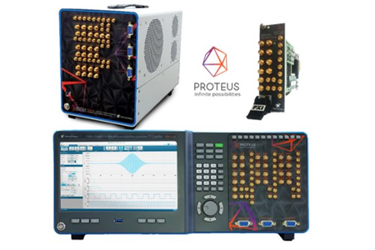10 Tips For Electronic Warfare And Radar Signal Simulation

It is now possible to adapt a test and evaluation strategy to encompass new threats by using commercial off-theshelf (COTS) transceiver subsystems. The Proteus Arbitrary Waveform Transceiver (AWT) is an advanced FPGA based RF transmitter and receiver hardware platform that provides a key building block for closed-loop or hardware-in-the-loop test systems. With three modes of operation, it changes the way you approach emulate threats.
As an RF Arbitrary Waveform Generator with 4.5GHz of instantaneous transmission bandwidth, deep memory, and dynamic upload capability, you’ll never run out of waveform memory while recreating the details of threat characteristics. The transceiver has 2.7GHz of instantaneous receiver bandwidth and a programable FPGA, allowing you to adapt to the threat behavior in real-time. It delivers wideband streaming capability enabled by PCIe Gen 3, x8 backplane technology, providing the ability to playback RF events from a hard disk array.
The Proteus Series is fully scalable to many channels and can be packaged as a benchtop, desktop instrument, or as a PXIe module to best suit your test and evaluation needs. It offers full-phase coherent operation across all channels.
In this application note we cover the following 10 use scenarios of the Proteus AWT.
- Using direct digital architecture for Signal Simulation
- Generating Wide and Ultrawide Bandwidth (UWB) Signals
- Determining Agility and Frequency Switching Speed
- Understanding Coherence
- Creating directional signals (Angle of Arrival)
- Developing complex multi-emitter scenarios
- Real Time Scenario Generation
- Closed Loop, Hardware in the Loop (HiL) for Radar Target and Altimeter evaluation
- Adding realism with Background Electromagnetic Emissions (EME)
- Understanding the Benefits of Commercial-of-the-shelf
Get unlimited access to:
Enter your credentials below to log in. Not yet a member of RF Globalnet? Subscribe today.
